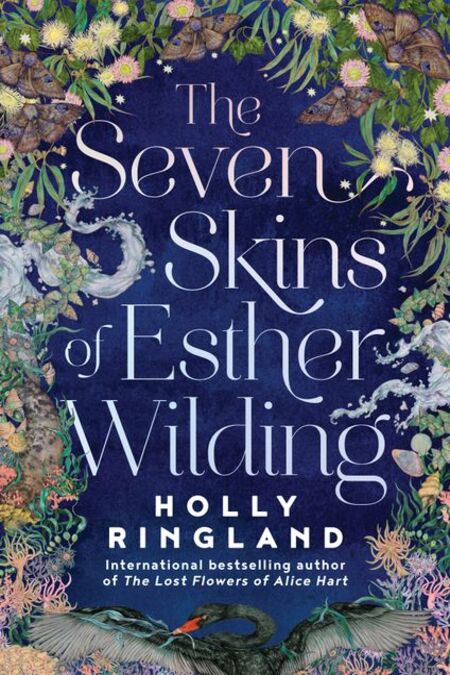If you have ever felt the full and unyielding grip of grief, you will be all too well acquainted with how impenetrably tight and suffocating it can feel.
When it has its hold upon you, it becomes near impossible to imagine what it would like to be free from it; all you know is sadness, loss and a deep, abiding sense that the life you once knew has ended and a new one, one that is alien and unwelcome and bereft of the person you love, has begun.
Explaining how this feels to someone fortunately unfamiliar with the sensation can feel utterly achievable but now those of us struggling to articulate what it feels like to be in the maw of grief has a way to explain what they’re going through with the publication of The Seven Skins of Esther Wilding by Holly Ringland.
Set in Lutruwita (Tasmania), Australia’s most southerly estate and home to wild and untamed landscapes awash with a sense of timelessness and mystery, this movingly profound and warmly hopeful novel is not shy about how much devastation grief brings in its wholly destabilising wake.
It embraces and is honest about grief can send schisms through family, how it can stop someone’s life in its tracks so absolutely that treading water becomes the default and how we can feel estranged from that or whom we were once close or amplify already existing emotional chasms.
‘You sure you’re okay doing that alone?’ Nin asked.
Esther watched bodies of golden kelp curl in the shallow, rhythmic waves on shore. Nodded again.
‘Any idea where?’ Nin asked.
‘Ah,’ said Nin, reading Esther’s face. ‘You’re going to bury her there.’
Esther scanned the softening sky. ‘Before the first star comes out,’ she said, beginning to gather her things.
Rich with a love of stories and their power to help us make sense of everything, including the darker parts of life, The Seven Skins of Esther Wilding is a love letter to the grim realities of living but also to the sense that we grow and find meaning in the connections around us, whether that is with close friends or family.
It is a celebration in large part of sisterhood, of two remarkable young women, Esther Wilding and her now-dead sister Aura who was last seen walking along the seashore, her course set firmly for the waves crashing near her, crying out in agony for someone lost so completely it seemed it could never be found.
Esther is bereft without her leading light and lifelong companion, her older sister who was cooler, bubblier and more engaged with life than anyone she knew and after whom she wanted to model her life.
Lost without her sister, and caught in a destructively nihilistic cycle of excessive drinking, careless sex and abandonment of her lifelong dream to become an astronomer, Esther finally agrees to journey to Copenhagen, and then the Faroe Islands, to discover what drove her sister, in love with the sea, its freedom and the evocative ways stories, especially those in Danish folklore that she embraced far beyond any academic interest, brought it to life, to take her own life.
It’s a journey driven by agony and blinding sadness but one Esther, encouraged almost manipulatively by her therapist father and tattooist mother feels she has no choice but to take if she is to have any peace with her life going forward.
With a journal Aura kept in her hand – a journal, by the way, that began she was a young teenager, mysteriously stops its musing at 15 before resuming when she’s in her twenties and obsessed with fairytales about selkies – and all too aware there is so much she doesn’t know about the sister who was as close as breathing itself, Esther sets off to discover why it was that Aura felt compelled to tattoo seven cryptic verses on her body and what they could possibly mean.
With an air of magical realism about it, The Seven Skins of Esther Wilding, while staying firmly rooted in a harrowing truthfulness about grief and loss, begins to slowly but slowly assume a sense that perhaps life’s joys and possibilities don’t end for us when someone we love dies.
That maybe, just maybe, in the impenetrable fog of desperate sadness and harrowing emotional deadness we can find not only answers, incomplete as they may be (though illuminating nonetheless), but a way to move forward and people with whom that journey can take place.
Esther finds all that and more, and what makes The Seven Skins of Esther Wilding such an immersively rewarding read is that it comes to this places of answers and hopefulness in a way that feels realistically grounded and honest, not pretending for a second that you simply flick a switch and suddenly everything feels better again.
She tucked her guidebook into the pocket of her windcheater. Step by step by step.
Aura followed in the edges of her vision, in the space between her heartbeats. Esther fought the twin urges to draw her sister close and leave her behind.
She walked the road, uphill, looking for the trailhead. All the while breathing through the guilt and contradiction burning in her body.
That’s simply not how grief works, no matter how it manifests for you, and Ringland captures it true extent and power so achingly well that you will marvel at the way she reaches down into your soul and gives you the words you need to articulate your pain.
Granted, not all of us go through the pain of losing someone in inexplicable circumstances where the whys and the wherefores are lost to the mists of time, but even so, the grief is no less penetratingly soul-disruptive and The Seven Skins of Esther Wilding brings this universality of grief to the fore while exploring the uniqueness of losing someone in a way that throws up far more sorrowful questions than comforting answers.
The great gift of this novel, quite apart from the journey of grief and healing on which it takes us, is that it gifts us with real people who don’t simply skip out of the terrible sadness of their interim world into a changed but optimistically changed future.
Esther in particular, but also those around her, including Aura’s best friend Nin, and the sisters’ mother who harbours great pain of her own, have to work hard, battling external circumstance and internal obstacles, to get to the point where life doesn’t feel just possible again but wholly and evocatively, joyfully alive.
It’s an arduous journey, marked by steps forward and steps back, but it’s one that Ringland brings evocatively alive with poetic emotionality in The Seven Skins of Esther Wilding, a novel which weeps with loss, sits in the inertia of painful loss and roars back, first with a whimper and then with a joyful bang, and which helps us to see that while grief can be overwhelmingly overpowering, life is more powerful still if only we can reach a place where we can let it in.

